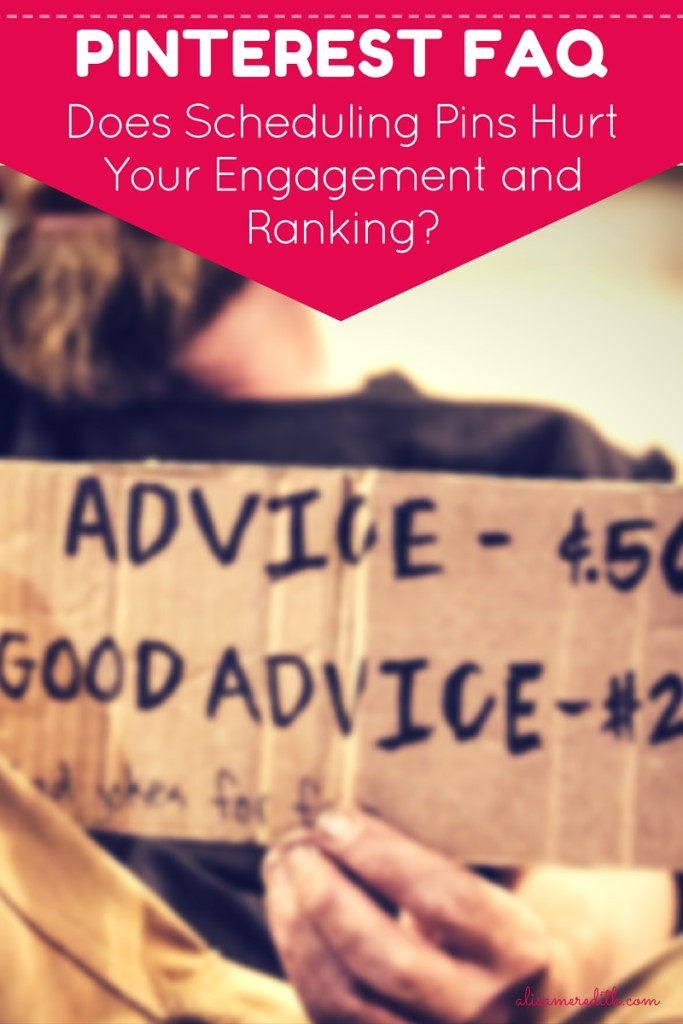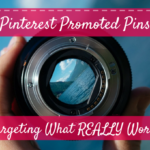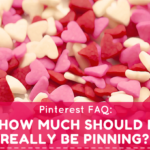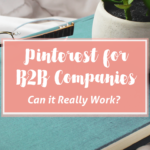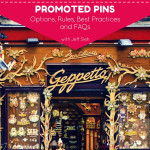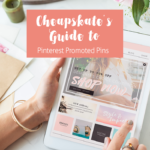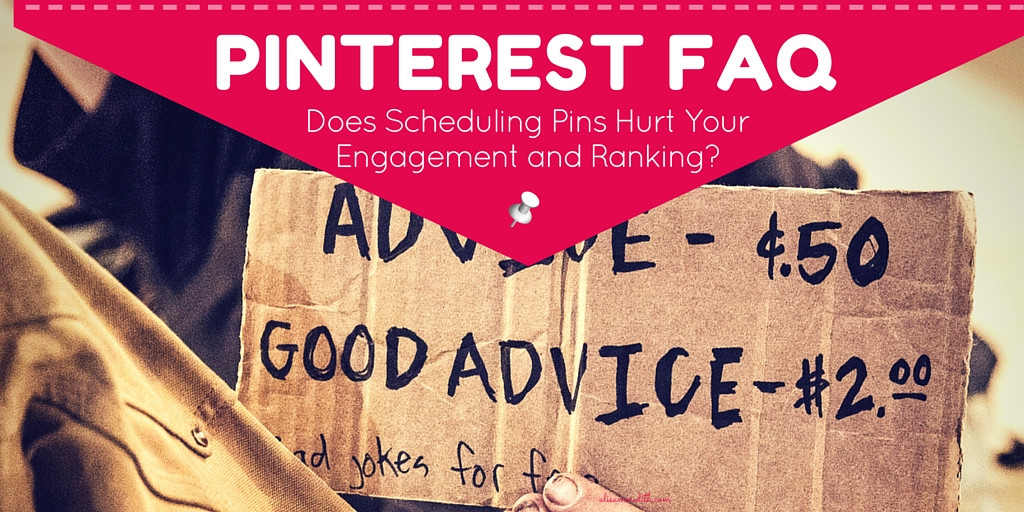 Have you read this one? “I stopped using all schedulers on Pinterest and my traffic increased by 700%!” It goes right along with the “you should always delete underperforming pins – and often.” Sigh…
Have you read this one? “I stopped using all schedulers on Pinterest and my traffic increased by 700%!” It goes right along with the “you should always delete underperforming pins – and often.” Sigh…
Just like the early days of SEO where every outrageous claim, backed by zero or questionable evidence gave rational humans pause, claims like this need to be examined closely before we completely lose the point of Pinterest for marketing. That is, creating a useful and beautiful resource to attract potential customers, driving traffic and leads to your website, and increasing sales of your products.
It would be foolish to ignore smart techniques for improving your traffic and lead generation, but I admit have a visceral aversion to gaming the system that is my happy place. Am I missing out by not jumping to these conclusions and believing the impassioned anecdotes? Should I abandon my Pinterest scheduler and attempt to manually pin 10-30 great images per day at strategic times?
Skip ahead to Friday evening – I’m using my favorite Pinterest scheduler, Tailwind, to load up my account for the weekend. But this article I’d read earlier in the week kept haunting me. Was I really hurting my account by using this tool?
The Truth Behind the Claim:
There are reports that Pinterest watches your account activity and favors pinners who go to Pinterest itself, follow people, like, repin, and comment. This makes sense. Pinterest wants to maintain the organic feel of its social search engine, and people who are invested enough to actually put time into the platform itself are likely to be providing quality content and should see something of a benefit in rankings. Therefore, it is important to regularly use the platform manually.
And then there is Facebook. Yes, Facebook has gone back and forth over whether using a 3rd-party scheduler hurts your exposure (consesus is, it does). However, Pinterest is not Facebook and
Scheduling Pins Will NOT Hurt Your Pinterest Ranking or Views
Back to my Friday night pin scheduling. Tailwind has a help chat within the dashboard. I thought – why not just ask? I put my question to Emily,
“Do you have any data on whether manual pins do better than scheduled? Huge debate on that now.”
A few moments later, I got this reply from Alex (I made the main points bold for your scanners out there) which I quote with his permission:
“Hi there,
This is Alex, and I’m one of the co-founders of Tailwind.
Thank you for bringing this up and asking us about it directly! You’re definitely on the right track here.
It’s unfortunate, but there’s a LOT of misinformation out there that is being perpetuated without any basis on facts or data. The assertion that using Tailwind lowers your engagement is absolutely false (we’ve confirmed this with Pinterest directly) and I’m happy to back it up with the 40,000+ pins (and growing) that are published through Tailwind each day. In fact, our data shows that user’s who pin using our recommended times outperform those who do not, which is why we built that feature in the first place. However, one thing is very important to understand: this is not to say that bad behavior (i.e. spamming) could have detrimental effects on someone’s account regardless of if they use a scheduling platform, or which scheduling platform they use.
If you think about it, this is the absolute last thing that Pinterest would want to do. Why would Pinterest want to discourage and “punish” the very people who make it what it is and add so much great content into the platform each day? Why would they “punish” people who use partner apps like Tailwind when it’s clearly a mutually beneficial relationship for everyone (Pinterest, its Partners, and Bloggers included)? Finally, why would Pinterest be sabotaging the very same Developer Partner ecosystem that they have invested so much in and are working so hard to build?
Unfortunately, this isn’t the first time that we’ve heard about false assertions coming from other [non-partner scheduling apps] and I’m sure they will continue.
As much as we’d love to “set the record straight” with everyone, we’d rather focus our limited time and resources on building a better product for our users vs. fighting off rumors.
I hope this helps clear things up a bit for you – hopefully confusion about things like this dissipates over time as more and more people become better informed. If there’s anything else we can clarify for you, please don’t hesitate to ask.
Have a fantastic weekend!
Best,
Alex”
Why Scheduling Pins Won’t Hurt Your Engagement
Stick with a Pinterest API partner and you will not experience any negative impact on your Pinterest marketing. Well, that is, as long as you aren’t spamming. But you’re not – I’m sure. Other partners include Hootsuite, Ahalogy, Piquora, Buffer and more.
I’m not so naive as to believe this will put an end to the false claims that using a scheduler (or particular scheduler even if the provider is a Pinterest API partner) hurt engagement, reduce traffic, or otherwise hurt your marketing. But for those of you who are looking for a rational response to all the misinformation out there, I really hope this helps!
 And yes, Tailwind is sponsoring the Visual Social Media Conference I’m organizing with Jeff Sieh and Vincent Ng AND I’m an
And yes, Tailwind is sponsoring the Visual Social Media Conference I’m organizing with Jeff Sieh and Vincent Ng AND I’m an 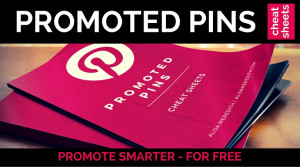 occasional blogger for them. However, if I really wanted to cheat my way into higher engagement and rankings, I’d keep this to myself and let people try to manually pin everything and have no time for anything else :).
occasional blogger for them. However, if I really wanted to cheat my way into higher engagement and rankings, I’d keep this to myself and let people try to manually pin everything and have no time for anything else :).
Keep Pinterest beautiful and interesting by sharing your best pins – through schedulers, manually, and by repinning. Find new boards and pinners to enrich your life and marketing by visiting the site and following new and interesting people and boards. But, don’t feel you have to be glued to the platform to keep a consistent flow of great content. Schedule happy, pinners.
While you’re at it, please pin me:
Related Articles:
Related Posts
Latest posts by Alisa Meredith (see all)
- How Much Do Pinterest Ads Cost? - December 10, 2021
- Surround Sound Marketing – The Content Strategy of the Future - November 29, 2021
- How to Build Your Business with Word-of-Mouth Marketing - November 18, 2021
